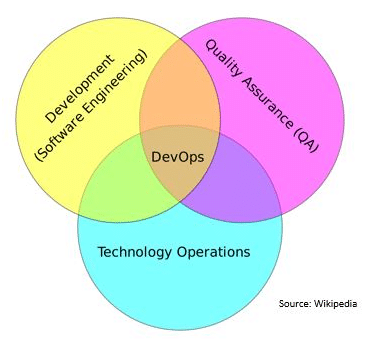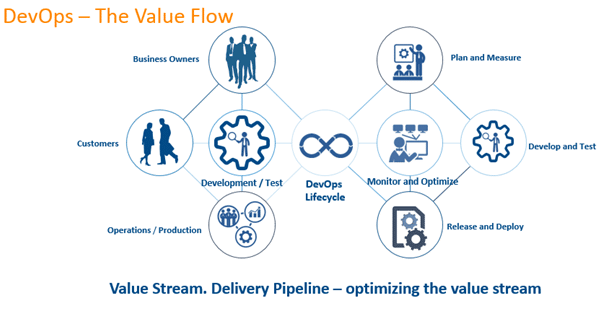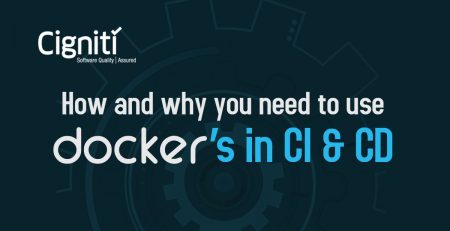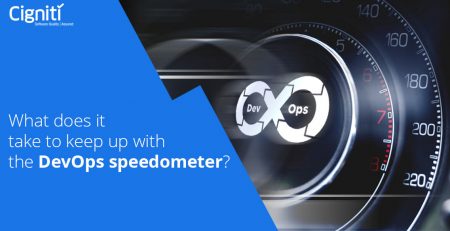What is the Role of QA in the World of DevOps?
DevOps is an extension of the agile software development approach and enables simultaneous software development and testing through continuous collaboration between all stakeholders. Today’s Enterprises are witnessing a rapid adoption of DevOps to accelerate time to market and better respond to and meet ever-changing customer needs. DevOps has emerged from the necessity of businesses to respond more quickly to market changes to gain competitive advantage and rapid business growth.
Five stages of DevOps:
- Normalization (Stage 1): Application development teams use version control. Teams deploy on a standard set of operating systems.
- Standardization (Stage 2): Teams deploy on a single standard operating system. Build on a standard set of technology.
- Expansion (Stage 3): Individuals can do work with manual approval outside them. Deployment patterns for building apps/services are reused. Infrastructure changes are tested before deploying to production.
- Automated infrastructure delivery (Stage 4): System configurations are automated. Provisioning is automated. System configs are in version control. Application configs are in version control. Security policy configs are automated.
- Self-service (Stage 5): Incident responses are automated. Resources are available via self-service. Applications are rearchitected based on business needs. Security teams are involved in technology design and development.
- Build the foundation (Stage 0): Monitoring and alerting are configurable by the team operating the service. Reuse deployment and testing patterns for building applications or services. Teams contribute improvements to tooling provided by other teams. Configurations are managed by a configuration management tool.
Source: State of DevOps survey report 2019 by Puppet Labs
DevOps practices are intended not only to improve the regularity of feature releases but also to reduce defects. DevOps emphasizes constant and collaborated development and deployment of applications. DevOps is the answer to enterprises’ requirement to catch up with the relentless speed of business growth. It is driving enterprises to streamline and speed up the delivery of applications along with changes and innovation. It isn’t just about continuous delivery but also about continuous improvement of software.
DevOps – Why, What, How & Who?
- Why: Increase business benefits by reducing the transaction cost associated with delivering incremental change.
- What (Goal): Clarity, consistency, and collaboration to understand the changes that each release brings to the IT and customer environments
- How: Methodology and tools that continue to evolve
- Who: Developers, QA, and Operations
Key Highlights of DevOps
- Quicker and faster software delivery
- Stable operating environments
- Early detection and faster correction of defects
- Transparency and Collaboration across teams
- Continuous release and deployment
- Continuous testing
- Continuous monitoring
- Reduced time to market
- Improved quality
The Cultural Shift
DevOps is all about keeping the software deployable at any point in time over working on new features. It calls for a cultural shift among all stakeholders of the organization. It requires them to come together and work towards a common goal of creating rapid, reliable, and repeatable processes. DevOps encourages development and operations teams to function as one single team, focused on delivering business value across the IT value chain.
Traditionally, development and operations teams usually have different deliverables and responsibilities. The development team continuously develops software/applications based on changing user needs or market demands for new features or making changes and fixes in the existing product. The operations team tries to retain everything as constant as possible to deliver maximum stability and availability of software services.
Between the two goals of the Development and Operations teams, Quality Assurance (QA) plays an important role as a key enabler in delivering business value. DevOps seamlessly integrates all three functions – Dev, Ops, and QA into a single IT entity that delivers value. DevOps breaks down the organizational silos between development and operations teams. It emphasizes that QA is everyone’s responsibility. QA & testing is a bridge between all disciplines, from clients and business to development and operations in DevOps. QA & testing is viewed as one of the most vital levers for accelerating time to market within DevOps initiatives.
The Strategic Role of QA in DevOps
In the DevOps approach, testers and developers play equally important roles. DevOps has blurred the boundaries of job responsibilities between a developer and a tester. QA ties together development and operations and enables them to collaborate to have software and applications up & running. Everyone in the organization takes responsibility for quality and stability, thereby for the business’s success.
A developer thinks more like a tester and continually checks their own code for potential errors. Conversely, a tester, whose responsibility is to test the application/software using different testing tools & methodologies, also fixes the code. In such a scenario, organizations without a strong and definite QA and testing strategy to “continuously test” in DevOps face troubles in meeting their goals for an accelerated speed of delivery.
As discussed in our previous post – Importance of Continuous Testing in DevOps – Continuous Testing, when implemented diligently, allows flawless continuity in the delivery cycle. It reduces the time from development to operations. QA is moving into a more strategic role of building robust software testing infrastructure while tracking quality across the SDLC.
Having a QA strategy and best practices in place has become very relevant. Organizations are readily embracing the DevOps movement to enable effective software development and operations while achieving superior quality and user experience.
DevOps QA testing plays a pivotal role by seamlessly integrating quality assurance practices throughout the development lifecycle. QA testers in DevOps collaborate closely with developers, automate tests, and continuously monitor application quality to ensure rapid and reliable software delivery.
10 Best Practices of QA in a DevOps Scenario:
- QA and testing teams should be part of technical teams. They must move beyond manual functional testing and focus on automation and testing strategies. QA becomes the enabler of quality across SDLC.
- Quality needs to be well-defined to meet requirements. Rather than achieving perfection in software, QA should focus on satisfying user experience within the given time frame.
- Metrics that measure quality have to be laid down and measured. Such metrics should detect software defects early in the development cycle.
- The goals of individuals and teams need to be optimized. Organizations need to strengthen necessary behavior and cultural shifts by incentivizing quality assurance.
- Requirements need to be specific for DevOps for QA. QA teams should be proactively involved in the requirements process to help guide development teams toward a proper direction.
- QA & testing should focus more on automated regression testing on critical areas such as key software functionality.
- DevOps QA & testing must leverage automation tools to automate testing wherever possible.
- Development, operations, and QA teams should be facilitated and encouraged to communicate, collaborate, and optimize their efforts.
- Continuous integration is the key to identifying defects early in the development lifecycle. To implement continuous integration effectively, all the stakeholders must integrate their work often daily.
- A fully automated continuous testing process must be integrated into the SDLC for a successful continuous delivery process that minimizes risks, reduces costs, and accelerates time to market by frequent releases.
At Cigniti, we standardize efforts and ensure accelerated time to market with DevOps testing solutions. We also focus on delivering improved deployment quality with greater operational efficiency. Our DevOps testing specialists enable your application testing efforts with their rich experience in Continuous Integration (CI) testing and can configure and execute popular CI tools, helping clients’ DevOps teams. Talk to us today.







Leave a Reply